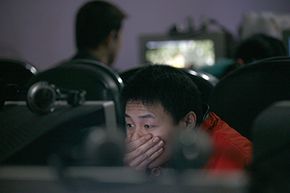Long shadows slowly consume the orange glow of twilight as dusk settles across a sleepy Midwestern town. Inside a small apartment, a young man, Ben, hunches over his computer, mindlessly clicking the mouse and tapping the keyboard as the screen illuminates his face with blue light.
His tired eyes follow the elfin avatar he navigates through a dusty, orange landscape dotted with rugged trees and inhabited by a vast array of mythical creatures. Occasionally, Ben's character encounters an enemy, which he quickly slays before snatching its loot — valuable items like virtual coins. He's obtained quite a cache of these coins, actually, after playing the game for 10 hours straight. He'll need them to buy things like armor and weapons that will help him move up in the game. "I'd be a level 100 if it didn't take so darn long to earn these coins," Ben thinks to himself before his mind wanders back into his fantasy world.
Advertisement
Cut to a small office half a world away in China. Dozens of workers are crowded around long tables, each sitting at a computer under the buzz of cold fluorescent lights. A closer look reveals something surprising: They're all playing a computer game. In fact, it's the same one Ben's slogging through. The difference is that while Ben is parked in front of his computer for fun, the Chinese players are working. And the coins they earn are, in a sense, real money because they're getting paid based on the number they bring in.
And why are they working so hard to play a video game? To sell coins to impatient players like Ben, of course. Welcome to the world of gold farming, a trade in which individuals play online games to earn virtual currency and other goods, then turn around and sell them — for real money — to other players looking for a shortcut.
Advertisement





